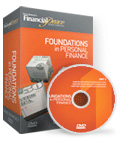In contemplating whether to write this post, I weighed the negative aspect of “tooting my own horn” with the positive aspect of helping get more high schoolers some solid financial traini ng. One compelling factor in my decision is that Austin Morgan at Foreigner’s Finances had already shared this info in our recent podcast interview. Soooo…the latter won out, and here is the story of how we were able to incorporate great financial training into the local high school curriculum.
ng. One compelling factor in my decision is that Austin Morgan at Foreigner’s Finances had already shared this info in our recent podcast interview. Soooo…the latter won out, and here is the story of how we were able to incorporate great financial training into the local high school curriculum.
“I wish I had know this when I was younger.”
As our church has hosted Dave Ramsey’s Financial Peace University (FPU) over the years, the most oft repeated comment from the participants has been, “I just wish I had known this stuff when I was younger.” Our leadership team has been empathetic – we all wish we had developed better financial foundations when we were younger. But one night, after hearing this lament once again, a light bulb came on for team member Lisa, “Maybe we can’t turn back time, but surely there is something that we can do to help our current generation of young people learn these principles.”
A lively discussion ensued, resulting in assignments. Mine was to learn if such an agenda existed. Lisa and Tami were charged with learning what was currently being taught at our community high school.
Getting our foot in the door
I learned that Dave Ramsey does indeed have a program designed specifically for high school students. Lisa and Tami learned that economic theory (not personal finance) was being currently taught. So Lisa and I (with the support of our team) forged ahead, making an appointment with the principal to solicit interest in the Dave Ramsey high school version of FPU. Although the principal was open to the idea, he needed to figure out how to integrate it into their curriculum and also get his business teacher on board. Red tape? Yes. Unfortunately, the business teacher, who was close to retirement, was less than enthusiastic about starting something new. The principal respected the teacher’s wishes and FPU for students went on hold.
A break through
We bided our time. The next school year, the business teacher had retired, the principal had become superintendent, and a new principal was appointed. Lisa and Joe tried again, with much better results. We met first with the superintendent – former principal – who encouraged us to meet with the current principal. More appointments, scheduling and meetings were required. We gave Principal Detering a copy of the Dave Ramsey syllabus, along with an introductory DVD about the class, “Foundations in Personal Finance.” We also offered to pay for all class materials. It was Spring, 2008. Principal Detering and class teacher Linda Wood enthusiastically endorsed the Dave Ramsey curriculum and agreed to integrate it into the Fall, 2008 agenda. The best news? Foundations in Personal Finance became a part of the class “Resource Management”, a requirement for all seniors.
The cost
“How much,” some of you are asking, “did this cost?”
Hey. I would be disappointed if you didn’t ask. After all, we are talking finances here. We had two basic choices: both involved purchasing the training DVDs featuring Dave Ramsey, but one option was to purchase individual student books while the other was to purchase a CD containing the book information in printable format. Option one cost less for the first year, but, because the student books would need to be replaced every year, would become more expensive the second year and each succeeding year. Because the second option would require the school to run copies for each student for each lesson, I discussed this option with Principal Detering, who readily agreed. Our total cost, therefore, for multiple years of great financial lessons for all high school seniors, came to $700.
How has it gone?
While I wish I could say that this class has revolutionized personal finance for every graduate, this is not the case. However, I am not surprised. No one at any age will “get” personal finance unless and until they are ready to learn. And while Dave Ramsey appeals to some high school students, he comes across as corny to others. Still, several have given me cause for hope. When I visited the class toward the end of last school year, I asked, “OK. What is Baby Step One?” I was pleasantly surprised to see numerous hands shoot upward. One senior asked me the best way to start her own Roth IRA. Several told me they want to make it through college debt free. And one upcoming entrepreneur, as a way to earn extra money, baked home made cookies to sell to fellow students while they dined on school lunches. Although Principal Detering had to curtail this endeavor, he nevertheless admired her initiative.
Concluding thoughts
I have zero regrets about getting this program into our local high school. Yes, it took some perseverance (and expense) to get it done. Some students roll their eyes and figuratively put their fingers into their ears. But…some are getting it.
These make the effort and expense all worthwhile…many times over.
What are the high school students in your community learning about personal finance? Have you been involved? How did it go?
Leave a Reply